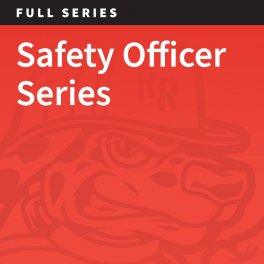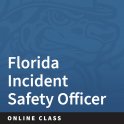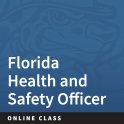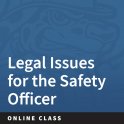Safety Officer Series
Safety Officer Series – Course Description
Ricky Rescue Training Academy’s “Safety Officer Series” is a self paced online fire course with continuous enrollment that provides a total of 135 hours of instruction (CEUs) toward the Florida Incident Safety Officer and Health and Safety Officer certifications. It is part of the pre-certification requirements set by the Florida State Fire College and aligns with NFPA 1521. This 3-part series includes the following courses: Florida Health and Safety Officer (FFP2811), Florida Incident Safety Officer (FFP2741), and Legal Issues for the Safety Officer (FFP2770).
Detailed Course Content
1. Florida Health and Safety Officer (FFP2811)
A self paced, 45 hour online course delivering 45 CEUs for Safety Officer certification. It fulfills key Job Performance Requirements in NFPA 1521 and builds foundational knowledge for implementing and overseeing department-wide safety initiatives.
Key learning outcomes:
- Safety regulations: Review OSHA, NFPA, and Florida standards governing emergency services safety programs.
- Risk management: Learn to anticipate and mitigate hazards in both operational and administrative settings.
- Safety program development: Create and manage SOPs, exposure control plans, and internal safety procedures.
- Performance evaluation: Measure safety program effectiveness using data-driven tools and statistical analysis.
- Wellness integration: Address behavioral health, occupational illness, physical fitness, and injury prevention.
- Ethical accountability: Understand the moral and legal obligations tied to leadership in health and safety.
- Program evaluation: Develop organizational and operational risk management plans aligned with NFPA 1500 and NFPA 1561.
- Specialized topics: Infection control, firefighter wellness, and NFPA 1581, 1582, and 1584 compliance requirements.
- Final project: Analyze a firefighter injury report, propose corrective actions, and outline preventive measures for future incidents.
Suggested textbook: Occupational Safety and Health in the Emergency Services, 5th Ed., J. Angle, ISBN: 9781284178070
2. Florida Incident Safety Officer (FFP2741)
A 45 hour online course awarding 45 CEUs and fully aligned with NFPA 1521. This course provides tactical and operational knowledge for fireground and all-hazard incident safety oversight.
Key learning outcomes:
- ISO role and scope: Understand duties at structure fires, hazmat scenes, rescues, wildland fires, and EMS incidents.
- Risk recognition: Interpret building construction, smoke conditions, and crew actions to identify hazards.
- Scene management: Monitor tactical assignments, accountability, collapse zones, and environmental hazards.
- Behavioral observations: Recognize signs of cognitive overload, fatigue, tunnel vision, and panic.
- Command interface: Communicate effectively with Incident Command and deliver real-time safety input.
- Post-incident actions: Conduct post-incident analysis, safety briefings, and ISO documentation.
- Practical assignments: Mock interviews, SOP/SOG development, and case study reviews.
- Capstone project: Analyze a firefighter line-of-duty death, critique response decisions, and propose safer operational strategies.
Suggested textbook: Fire Department Incident Safety Officer, 3rd Ed., David Dodson, ISBN: 9781284041954
3. Legal Issues for the Safety Officer (FFP2770)
This 45 hour online course delivers 45 CEUs and explores legal responsibilities and exposures relevant to the Safety Officer role in Florida. It prepares students to navigate statutory authority, liability, and documentation obligations.
Key learning outcomes:
- Legal authority: Understand the statutes and rules that grant Safety Officers their inspection and enforcement powers.
- Liability risks: Identify legal vulnerabilities tied to negligence, omission, or procedural failure.
- Documentation standards: Create defensible safety reports, incident logs, and compliance records.
- Ethical decision-making: Navigate legal gray areas using industry best practices and professional codes of conduct.
- Employment law basics: Review protections and limitations related to personnel management and internal investigations.
- Florida-specific laws: Study FSS 633 and FAC 69A as they relate to safety and line-of-duty deaths.
- Litigation awareness: Explore current legal trends and the consequences of unsafe operations.
- Practical exercises: Engage in case study defenses/oppositions, mock trials, and compliance assessments.
- Final project: Complete a 69A-62 compliance checklist, prioritize top safety issues, and present corrective action plans.
Suggested textbook: Fire Service Law, 2nd Ed., Lawrence T. Bennett, ISBN: 9780763792741
Course Summary Table
Course | Hours / CEUs | NFPA Alignment | Coverage Highlights |
Florida Health and Safety Officer (FFP2811) | 45 h / 45 CEUs | NFPA 1521 | Risk management, safety programs, NFPA standards, wellness, program evaluation |
Florida Incident Safety Officer (FFP2741) | 45 h / 45 CEUs | NFPA 1521 | ISO duties, hazard recognition, SOP/SOG development, LODD analysis project |
Legal Issues for the Safety Officer (FFP2770) | 45 h / 45 CEUs | NFPA 1521 | Statutory authority, liability, litigation, compliance assessments, final project |
- CHAMILO_CODE 6741,6742,7529
Pack content
When completing an online or blended class through Ricky Rescue Training Academy, you will be held completely responsible for your own achievements. You must ensure that you work consistently and diligently to complete the coursework and related requirements in order to move forward. These open enrollment courses allow you to pace yourself, but will require sufficient self-discipline to keep up to date with the workload. Therefore, it is your responsibility to set aside the time required to complete the various units of these courses.






